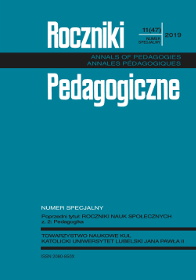Podstawowe czynniki wpływające na funkcjonowanie systemu readaptacji społecznej skazanych – diagnoza i rozwój
Main factors determining the functioning of the system of social re-adaptation of offenders – diagnosis and development
Author(s): Sławomir StasiorowskiSubject(s): Social Sciences, Education, Sociology, Criminology, Inclusive Education / Inclusion
Published by: Towarzystwo Naukowe KUL & Katolicki Uniwersytet Lubelski Jana Pawła II
Keywords: social re-adaptation; social rehabilitation; probation officer; probation
Summary/Abstract: The changing picture of the state’s criminal policy and the leading role of sanctions alternative to deprivation of liberty, i.e. the sanctions of fine and restriction of liberty, accompanied with limited educational-rehabilitative role of a probation officer, lead imperceptibly to the evolution of his tasks. At the same time, there is a growth in the expectations regarding the improvement of effectiveness of tasks aiming at helping an ex-convict to social rehabilitation that is usually perceived as providing supporting, material or administrative provisions and services. Recognizing these phenomena, the author presents a systemic approach to social re-adaptation of convicts, relying on a new, hybrid model of a preparation of a convict to live without liberty restrictions. The system, based on participants’ mutual knowledge about themselves, is not complicated, is comprehensible and should become common. The Author sees the institution of a probation officer, whose tasks have not been precisely legally described, having a central role in the system. At the same time, it has been indicated what possibilities are given by the observation of the functioning system, considering its effectiveness that may be used in the prognosis of re-offending regarding the convicts who will be subject to system’s influence.
Journal: Roczniki Pedagogiczne
- Issue Year: 11/2019
- Issue No: S
- Page Range: 439-459
- Page Count: 21
- Language: Polish

